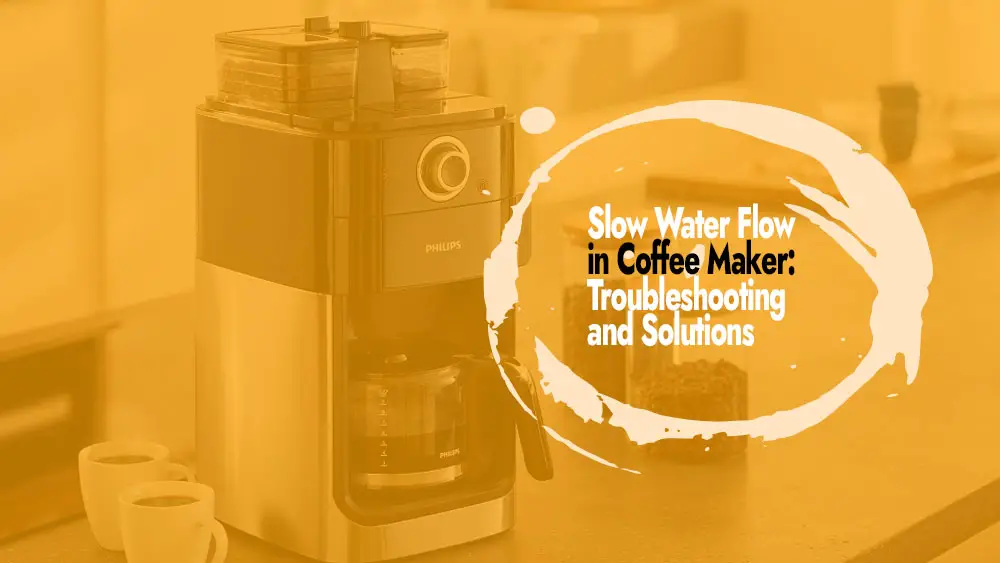As an Amazon Associate, I earn from qualifying purchases at no extra cost to you.
Slow Water Flow in Coffee Maker: Troubleshooting and Solutions
When the water flow in your coffee maker slows down, the joy of a perfectly brewed cup of coffee can quickly turn into anger. This problem can happen often with coffee makers, and it can have a big effect on how your coffee is made and how good it tastes. In this article, we’ll look at the different things that can cause a coffee maker’s water flow to be slow and talk about ways to fix the problem. By knowing the causes and using the right solutions, you can make sure that the brewing process goes smoothly and quickly.

1. Mineral Buildup and Scale Formation
Mineral buildup and scale are two of the main reasons why coffee makers don’t work as well as they used to. Over time, minerals in the water, like calcium and magnesium, can build up inside the coffee maker, making it hard for water to flow through. This buildup slows the flow of water, so brewing takes longer. The problem is more common in places where the water is hard, which means it has more minerals.
To solve this problem, the coffee maker needs to be descaled regularly. Scale and mineral deposits inside the machine can be removed with descaling solutions or professional descaling products. It is best to follow the manufacturer’s advice for descaling and to do it again every so often to keep minerals from building up.
2. Water Filter that is Clogged or Dirty
A slow water flow can also be caused by a dirty or clogged water filter. Coffee makers have filters that help clear dirt and other things from the water, making for a cleaner cup of coffee. But over time, coffee grounds and mineral layers can build up in these filters and make them hard to use.
To fix this, the water filter in your coffee maker should be cleaned or replaced regularly, based on the type of filter it has. For filters that can be used more than once, rinsing them well under running water can help get rid of any stuck dirt. If the filter is one that you can throw away, you should do what the maker says. By keeping the water filter clean and working, you can make sure there is a steady flow of water during the brewing process.
3. How Big and Good the Coffee Grounds Are
A coffee maker’s water flow can also be affected by how finely the coffee is ground and how good the coffee is. Fine grinds, which are often used for espresso, can sometimes make the water move slower because there is more resistance. On the other hand, a very coarse grind can cause the water to flow too quickly, which means that not enough coffee is being taken.
To get the most out of the water flow, it’s important to choose the right grind size for your coffee maker. Most drip coffee makers work best with a medium grind size. This is because it strikes a good mix between flow rate and extraction. Also, using freshly ground coffee beans can make your coffee taste and smell better and reduce the chance of clogs and slow water flow.
4. Not Enough Water Pressure
Your home or office may have low water pressure, which could cause the water to flow slowly. For coffee makers to work well, they need a steady flow of water. If the water pressure is too low, the water may flow slowly and the coffee may take longer to make.
You can try a few different things to solve this problem. First, make sure that your coffee maker’s water reservoir is full enough to keep the flow steady. If the water flow where you live is always low, you can help make up for it by using a coffee maker with a built-in water pump. You could also improve the water flow by adding a water pressure booster or calling a plumber to fix any plumbing problems.
5. Heating Element or Pump that Doesn’t Work
Rarely, a broken heating element or pump in the coffee maker can cause the water flow to be slow. The heater element is in charge of heating the water, and the pump is in charge of moving the water around the machine. If either of these parts is broken or doesn’t work right, it can slow the flow of water and make boiling less effective.
If you think a heating element or pump isn’t working right, you should call the maker or a professional technician for help. They can figure out what’s wrong and offer options, which may include fixing or replacing the broken part. It’s important to be careful and not try to fix things yourself to avoid doing damage or putting yourself in danger.
Conclusion
Slow water flow in a coffee maker can be annoying because it slows down the boiling process and changes the way your coffee tastes. By knowing the different things that could be causing this problem, such as mineral buildup, clogged filters, grind size, water pressure, and broken parts, you can take steps to fix it. Regular upkeep, like descaling, cleaning or replacing filters, and using the right grind size can help make sure that water flows the way it should, which means you’ll always get a delicious cup of coffee.
